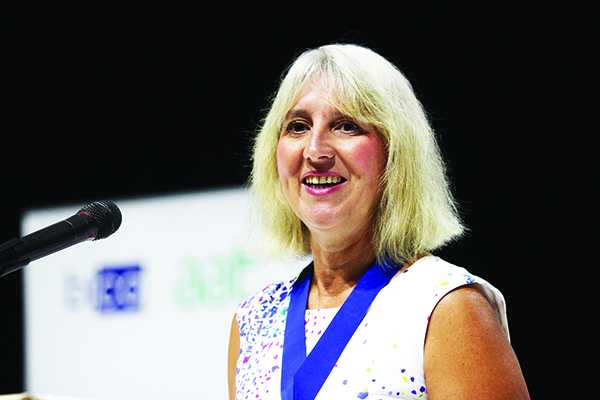How women are shaping Botswana’s new economy
Botswana is working hard to diversify its economy, which has historically been based on the production and sale of diamonds. The World Bank’s Doing Business Report shows that the country has the highest new business density in Africa with 13.11 new businesses registered, per 1000 adults. Education and entrepreneurship are key drivers of this growth, playing an integral part in reducing Botswana’s 29.4 percent youth unemployment rate - and women are at the leading edge.
Botswana’s women entrepreneurs are on the rise. The 2017 Mastercard Index of Women Entrepreneurs tracked the number of female business owners, as a percentage of total business owners, across 54 high, middle and lower income countries. Botswana, classed as an upper middle-income economy, was ranked second in the world at 34.6 percent (by comparison, Uganda scored highest at 34.8 percent and Saudi Arabia lowest at 1.5 percent). The latest data from the Global Entrepreneurship Monitor (GEM) also ranks female entrepreneurship in Botswana as the third highest in the region. And it’s not only the number of female entrepreneurs that is increasing - Batswana women are making headway in formal employment too. According to a 2017 report by Grant Thornton, Botswana has improved significantly in terms of the percentage of senior roles held by women, increasing by eight per cent from 23 percent in 2016 to 31 percent in 2017. (Globally, the proportion of senior leadership roles held by women has moved by just one per cent, from 24 percent in 2016 to 25 percent in 2017). Botswana has also shown a six per cent reduction in the percentage of businesses with no women in senior leadership. The report recommends gender diversity at leadership level as it brings commercial benefits and leads to enhanced risk management. The report states, “teams without diversity are at a much greater risk of going down a path without considering all the options or coming up with other more complex solutions.”So what’s fuelling this rising tide of women business catalysts? According to Nicky Fisher, President of AAT (the Association of Accounting Technicians), the organisation has seen steady growth in the number of women enrolling on its courses in Botswana which she believes is helping to feed the growth and diversification of the local economy. Worldwide, AAT, a leading UK-based qualification and professional body for technical accountants and bookkeepers which has been operating in Botswana for 26 years, boasts a female membership of 70 percent.
“Our qualifications appeal to women who may be returning to work after maternity leave or having brought up their family, wish to enter the accounting and finance world,” she says.
“It stands to reason that if we are to build a bright economic future in Botswana, there will be an enormous demand for skills in the field of finance and accounting. It is only through a solid body of qualified finance professionals both in corporates and in entrepreneurial ventures, that growth can truly be supported in all other areas,” Fisher says.The OECD agrees. In a 2013 report the organisation noted that women even more than men need to be sufficiently financially literate in order to effectively participate in economic activities and to take appropriate financial decisions for themselves, their children, and their families. Unfortunately, barriers to women’s financial empowerment abound, including more limited access to education, employment, entrepreneurship and formal financial markets, as well as different social norms and legal treatment in many countries.Fisher says that overcoming such barriers is a key motivator for AAT. Globally, AAT is committed to advancing the important role that women play, and has signed the Women in Finance Charter, which commits signatory firms to support the progression of women into senior roles and to report on their progress. Fisher adds, “When taking an AAT course, you can start with no qualifications other than the ability to write and count, and begin working towards our exams. Expanding opportunities for women, addressing social mobility, helping people achieve their potential and tackling low productivity growth are all issues that AAT plays a key role in addressing”. Sharleen Mavundla Dube is an AAT graduate who is now furthering her studies with the Association of Chartered Certified Accountants (ACCA), a leading international accountancy body. She has always known the importance of accounting in the business world. “My dream” she says, “has always been to become an accountant – my father had a taxi business and I longed to do his accounts one day.” Dube became a qualified beauty therapist and owned a beauty parlour. She then joined AAT and moved closer to achieving her life-long dream. “AAT taught me how to cope with exam pressure. Actually, as soon as I finished studying, I began to miss it! My qualification enabled me to study further, and AAT’s high calibre meant I was exempt from three ACCA modules. In my work I have seen how some businesses lack a solid foundation, and we were taught how to overcome these deficiencies. A lack of skilled accountants can hold a company back.” She adds that AAT is based on practical real-work experience. “I gained skills, and AAT also readied me to fit right into the workplace. I received support in tips for job interviews, and AAT’s e-learning keeps me up to date with changes in the accounting field.“Now, my future looks bright and I can really say that I have accomplished something.” Ultimately, Dube feels her qualification has enabled her to provide for her pride and joy – her 10-year old son. Dube’s story provides context for the words of IMF head Christine Lagarde who said that empowering women is an economic game changer. “If you discourage half the population from fully participating in the labour market, you are essentially behaving like an airline pilot who shuts down half his engines in mid-flight. Sure, your plane will likely continue to fly, but it would be such a crazy thing to do!”It seems that Botswana’s new economy is not making this mistake.






